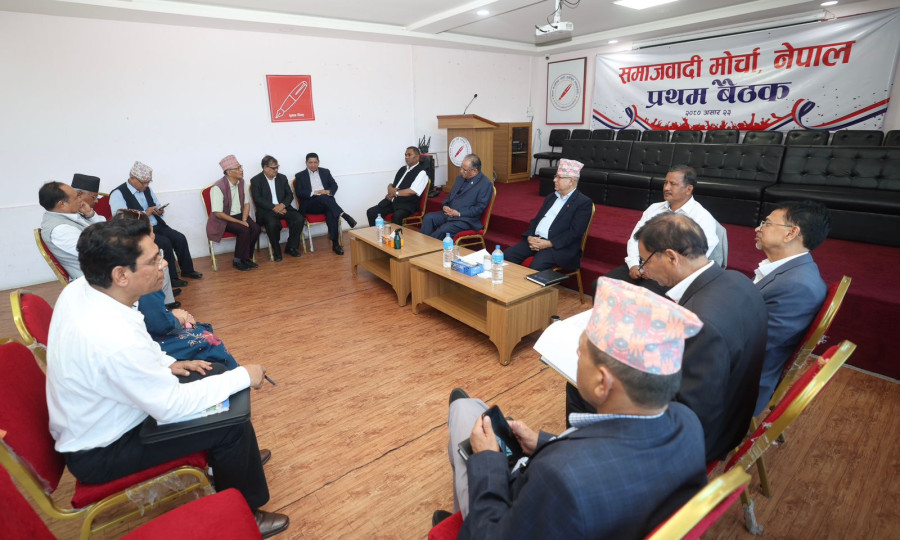Politics
Socialist Front meets but has little to offer
Leaders said the meeting focused on procedural issues, including rotational leadership of the front every six months.
Nishan Khatiwada
Three weeks after its inception, the much-touted alliance of the left-leaning parties—the Socialist Front—held its first meeting on Saturday at the CPN (Unified Socialist)’s central office.
As the meeting largely focused on the general issues such as formation of a task force and agreement on the leadership of the front, it yet again failed to bring something that could attract the general public, especially the young voters, who have now been enticed towards the newly-emerged political forces.
Attending leaders said the meeting was focused on procedural issues, including the leadership of the front, which would rotate every six months. The next meeting of the front has been scheduled for July 12.
The meeting has also decided to hold formal programmes in the major cities of each province to disseminate the front’s message.
According to Unified Socialist vice-chair Rajendra Pandey, the meeting formed a four-member task force entrusted with the preparation of the front’s code of conduct, policies and programmes.
The task force consists of Maoist Centre General Secretary Dev Gurung, Unified Socialist vice-chair Pramesh Hamal, Janata Samajbadi Party leader Rajendra Shrestha, and Nepal Communist Party spokesperson Khadga Bahadur Bishwakarma, according to Pandey.
On June 19, four leftist parties—the Maoist Centre, the Unified Socialist, the Janata Samajbadi and the Nepal Communist Party led by Netra Bikram Chand—announced the formation of the front.
The parties together have 54 seats (Maoist Centre 32, Unified Socialist 10, and Janata Samajbadi 12) in the 275-member House of Representatives. It has, however, the largest share in the federal Cabinet, with 10 ministers and three ministers of state. The Chand-led party did not contest the parliamentary elections.
However, political analysts and observers say that devoid of any new agenda, the Socialist Front has failed to give any hope to the general public, who are disenchanted towards the traditional parties.
Former Maoist leader Bishwo Bhakta Dulal, who heads the Baigyanik Samajbadi Party, believes that the newly formed political bloc has no significance. “The front was formed at the initiative of the CPN (Maoist Centre) to retain the constituents’ vote bank,” said Dulal, who is also a political analyst. “But I don’t think it is possible.”
The last major polls saw winds of change blowing as the new forces trounced the heavyweights of major political parties and made a significant presence in Parliament.
The Rastriya Swatantra Party, the Janamat Party and the Nagarik Unmukti Party made it to Parliament last November in their first attempt at parliamentary politics, winning 20, six, and four seats, respectively.
The victories of the Swatantra Party in the Tanahun and Chitwan by-polls have shaken the traditional parties, including the Congress, the CPN-UML and the Maoist Centre, to the core.
Political analyst Mumaram Khanal said the partners of the socialist front have seen internal troubles with their strengths weakened over time. “It is the Maoist Centre’s strategy to showcase more parliamentary strength,” he added. “And other parties have been taking up the strategy to be connected to the ruling coalition and grab opportunities and reap benefits as much as they can.”
The Maoist Centre has shrunk from 53 seats in 2017 to 32 seats in the House of Representatives. The Unified Socialist failed to even become a national party and the Janata Samajbadi has been weakened in its own bastion, Madhesh. The Chand-led Nepal Communist Party shuns parliamentary politics.
Khanal says the front doesn’t have an impressive agenda. “If the parties in the socialist front were so willing to raise public issues and get connected to the public, they would have done so when they were strong.”
The Maoist party emerged as the largest party after the 2008 Constituent Assembly elections. Unified Socialist chair Madhav Kumar Nepal had led a strong UML for more than a decade. Upendra Yadav, who leads the Janata Samajbadi Party, dominated Madhesh politics for long.
“Even with such strength, they failed to deliver and live up to their electoral promises,” Khanal said. “Now the front will most likely be embroiled in problems and turmoil, given their differing backgrounds and ideologies.”




 10.12°C Kathmandu
10.12°C Kathmandu















